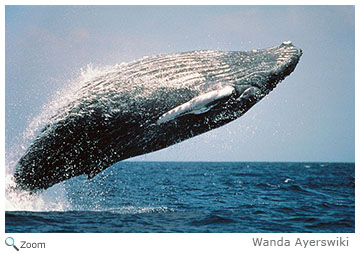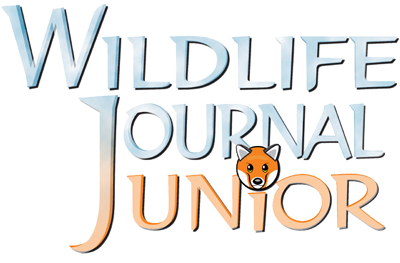Balaenopteridae - Blue Whale, Fin Whale, Humpback Whale, Minke Whale |
|
|
 There are eight species of baleen whales in this family. This family is also known as the rorqual whales. Rorqual is a Norwegian word for furrow. The whales in this family have furrows in their skin that run from their lower mouth to their stomach. There are eight species of baleen whales in this family. This family is also known as the rorqual whales. Rorqual is a Norwegian word for furrow. The whales in this family have furrows in their skin that run from their lower mouth to their stomach.
They vary in size from the 25-30 foot long minke whale to the 65-90 foot blue whale. They filter feed on krill and other small crustaceans and ocean creatures. Most of the species in this family live in open ocean waters. In the winter, they breed in temperate ocean waters.
In the summer, they migrate to cold polar waters that are rich in krill and plankton. Species in this family include: the minke whale, the sei whale, the blue whale, the fin whale, the humpback whale, and Bryde's whale.
World Status Key
 Least Concern Least Concern  Near Threatened Near Threatened  Vulnerable Vulnerable  Endangered Endangered  Critically Endangered Critically Endangered  Extinct in Wild Extinct in Wild  Extinct Extinct  Not Enough Data Not Enough Data
Status and range is taken from ICUN Redlist.
U.S. Status Key
 Threatened in US Threatened in US  Endangered in US Endangered in US  Introduced Introduced
Status taken from US Fish and Wildlife. Click on U.S. status icon to go to the U.S. Fish and Wildlife species profile. |
|
New Hampshire Status Key
 Threatened in NH Threatened in NH  Endangered in NH Endangered in NH  Breeds in NH (birds) Breeds in NH (birds)
Status taken from NH Fish and Game |
Location Key
 Africa Africa  Asia Asia  Australia/Oceania Australia/Oceania  Europe Europe  North America North America  South America South America  NH NH  Click for More Info Click for More Info  Click for Image Click for Image
 Arctic Ocean Arctic Ocean  Atlantic Ocean Atlantic Ocean  Indian Ocean Indian Ocean  Pacific Ocean Pacific Ocean  Southern Ocean Southern Ocean
New Hampshire Species |
|
North/Central American Species |
Humpback Whale - Megaptera novaeangliae    
Common Minke Whale - Balaenoptera acutorostrata    |
|
Blue Whale - Balaenoptera musculus    
Bryde's Whale - Balaenoptera edeni   
Fin Whale - Balaenoptera physalus    
Sei Whale - Balaenoptera borealis     |
Other Species Around the World |
Antarctic Minke Whale - Balaenoptera bonaerensis     
Omura’s Whale - Balaenoptera omurai     |
|
|
Additional Information Resource Key
 Profile Profile  Photos Photos  Video Video  Audio Audio  Interactive Interactive
Humpback Whale Migration Game 
Learn more about humpback whales and how they migrate.
Source: Hawaiian Islands Humpback Whale National Marine Sanctuary Intended Audience: Students Reading Level: Elementary School
Antarctic Minke Whale - Balaenoptera bonaerensis      
At 24-34 feet in length, the Antarctic minke whale is one of the smallest baleen whales.
Source: Arkive Intended Audience: General Reading Level: Middle School
Antarctic Minke Whale - Balaenoptera bonaerensis     
The Antarctic minke whale is found in polar to tropical waters of the southern hemisphere.
Source: Animal Diversity Web Intended Audience: General Reading Level: Middle School
Blue Whale - Balaenoptera musculus         
The blue whale is found in the open ocean, usually along the continental shelf edge and near polar ice.
Source: Arkive Intended Audience: General Reading Level: Middle School
Blue Whale - Balaenoptera musculus        
Blue whales are found in all oceans of the world, and they are the largest animals to ever live on Earth.
Source: Animal Diversity Web Intended Audience: General Reading Level: Middle School
Blue Whale - Balaenoptera musculus        
There are three subspecies of blue whale- Northern Hemisphere blue whale, the Northern Hemisphere blue whale, the Antarctic blue whale, and the pygmy blue whale.
Source: NOAA Fisheries Intended Audience: Students Reading Level: Middle School
Blue Whale - Balaenoptera musculus         
A blue whale's tongue can weigh as much as an elephant.
Source: National Geographic Intended Audience: General Reading Level: Middle School
Blue Whale - Balaenoptera musculus        
Blue whales are the loudest animals on Earth! Their call reaches levels up to 188 decibels.
Source: Enchanted Learning Intended Audience: Students Reading Level: Elementary School
Bryde's Whale - Balaenoptera edeni       
The Bryde’s whale is found in tropical and sub-tropical waters throughout the Atlantic, Pacific. and Indian Oceans.
Source: Arkive Intended Audience: General Reading Level: Middle School
Bryde's Whale - Balaenoptera edeni      
Bryde's whales are dark gray with a yellowish white underside.
Source: Animal Diversity Web Intended Audience: General Reading Level: Middle School
Bryde's Whale - Balaenoptera edeni      
Bryde's whales are named for Johan Bryde, a Norwegian man who built the first whaling stations in South Africa.
Source: NOAA Fisheries Intended Audience: Students Reading Level: Middle School
Common Minke Whale- Balaenoptera acutorostrata        
The minke whale has a a pointed 'dolphin-like' head and a double blowhole.
Source: Arkive Intended Audience: General Reading Level: Middle School
Common Minke Whale- Balaenoptera acutorostrata       
In Antarctic waters, minke whales make up most of a killer whale's diet (up to 85%).
Source: NOAA Fisheries Intended Audience: Students Reading Level: Middle School
Common Minke Whale- Balaenoptera acutorostrata        
Minke whales travel either alone or in small groups of 2-4 individuals.
Source: Animal Diversity Web Intended Audience: General Reading Level: Middle School
Fin Whale - Balaenoptera physalus         
Occasionally fin whales form groups of nearly 250 individuals near feeding grounds or during migration periods.
Source: Animal Diversity Web Intended Audience: General Reading Level: Middle School
Fin Whale - Balaenoptera physalus         
Fin whales sometimes mate with blue whales and hybrids have been documented.
Source: NOAA Fisheries Intended Audience: Students Reading Level: Middle School
Humpback Whale - Megaptera novaeangliae        
Humpback whales are highly migratory and are found in all oceans. Male humpback whales sing complex songs that can last up to 20 minutes and be heard 20 miles away!
Source: NOAA Fisheries Intended Audience: Students Reading Level: Middle School
Humpback Whale - Megaptera novaeangliae         
Hawaii is the only state in the United States where humpback whales mate, calve, and nurse their young.
Source: Hawaiian Islands Humpback Whale National Marine Sanctuary Intended Audience: Students Reading Level: Middle School
Omura’s Whale - Balaenoptera omurai  
Omura's whale has only been identified since 2003. It was previously thought to be a pygmy form of Bryde’s whale.
Source: ICUN Redlist Intended Audience: General Reading Level: Middle School
Sei Whale - Balaenoptera borealis        
The sei whale tends to avoid coastal waters.
Source: Arkive Intended Audience: General Reading Level: Middle School
Sei Whale - Balaenoptera borealis       
An average sei whale eats about 2,000 pounds of food per day.
Source: NOAA Fisheries Intended Audience: Students Reading Level: Middle School |

